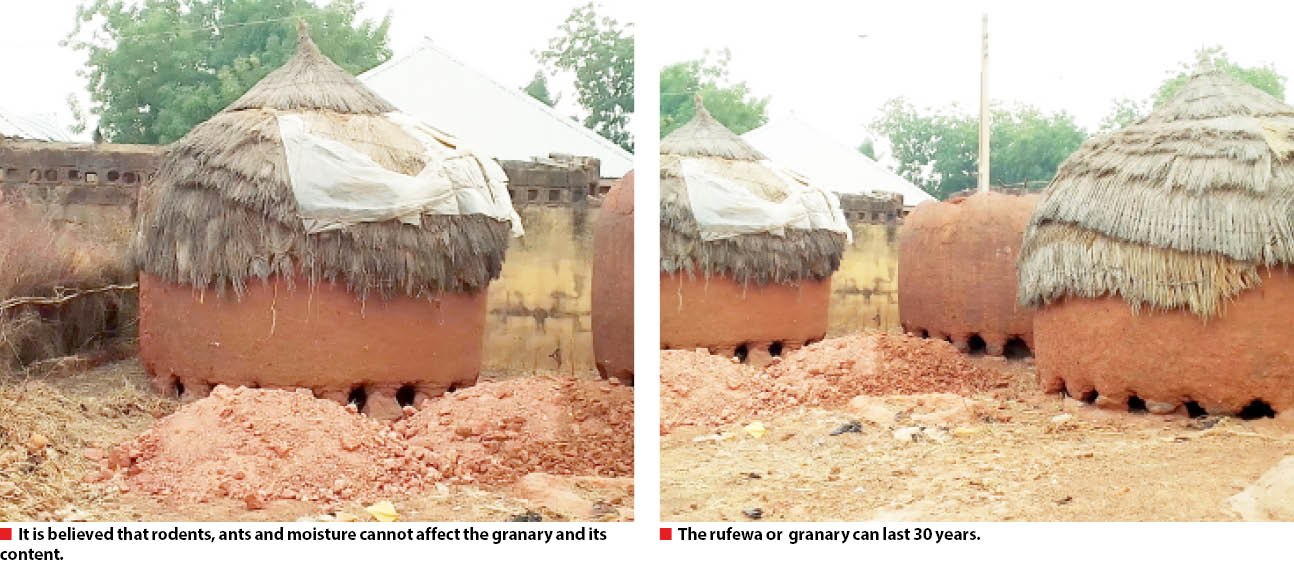Granary, which is common in Hausa land, can effectively store grains for 10 years, but many spend millions buying pesticides and insecticides to preserve grains. Centuries ago, farmers attempted to answer the vexed question of grain preservation by creating the Rufewa, which has been somewhat displaced by modern silos.
Behind the imposing Shehu Uthman Dan Fodio Mosque in Sifawa, Sokoto State, there is a traditional grain store. It is not clear if it is still in use, but it looks well catered for. Rufewa is the Hausa name for a traditional grain store, granary or silos, which is very popular in Hausa land. It is also referred to as Rumbu. Its base is made of clay and stones, and its construction reveals careful consideration of many things, such as a clear knowledge of the process of ventilation. There is science involved here. Interestingly, Rufewa is a form of agricultural wealth, which today, we may call food security.
Neither termites nor rodents
Professor Attahiru Sifawa of the Department of History, Sokoto State University, commented on the construction of the granary thus, “They will not use stones throughout the foundation. They will start at the base and raise it to form a shape and close it at the top. But it will not collapse. There is a small opening at the top, and they put some stalks to cover the top. Through this opening they will put grains into the silo. There is a lot of technology involved, and because of the way it is constructed, if you preserve your grains, termites and rodents will not be able to attack it.”
3 weeks of work
“Rufewa is constructed using the Matse technique. It is a construction technique that doesn’t use blocks but only parts of mortar, using bare palms. The construction process is slow owing to the fact that only one course could be laid at a time. It is for this that the mason usually lays one course in the morning and another in the evening. The construction work could go for up to three weeks to a month, depending upon the size of the Rufewa to be constructed,” Dr Umar Jabbi Mohammed of the Department of History and International Studies, Usman Dan Fodiyo University, Sokoto said.
Earth, water
On the materials to be used for construction he said, “The materials include earth mixed with water, together with an admixture of grasses, hay or even cow dung. These additives strengthen the adhesive properties of mud.
A well constructed Rufewa could last for more than 30 years. What only needs to be changed regularly (maybe after three years), is the thatch to protect the walls from the effects of rainfall.
“In the ancient days they would preserve grains for many years – more than a decade. This is what is known as Kurame Rufewi. Kurame is plural for Kurma, that is somebody hard of hearing.
“Grains are kept for a long period of time without opening the silo. You put grains in and close them and forget about them. That’s what makes them Kurame.
“The Rufewa grain store has been the traditional storage facility since very early times. As a storage facility, it protects the grains from moisture, rodents and ants. It also allows the movement of air in and out of the facility to ensure dryness.
“The grains stored inside the Rufewa granary are safe and could be kept for more than 10 years. This period of safety was confirmed by the actual users of the facility.”
Rufewa dying
Sifawa explained that when there is a very good harvest, the excess grains are stored in the silo, which is the local way of preserving grains, which has served Hausa communities for centuries. He continued, “It is only when there is need, maybe as a result of shortage of food supply, that they will go and open the Rufewa and start bringing out food. But this tradition is dying because of modernity.”
Insecticides, pesticides
“Even the rate of farming is declining. The elite in particular are not interested in farming. Only few persons engage in farming. “Now, there are insecticides and pesticides that are used for preservation of grains, but they are not as good as the traditional method of preservation. Applying chemicals to preserve grains has certain health implications,” he added.
Grains won’t decompose
Sifawa lamented, “If it was in Europe they would preserve it. For more than 10 years the grains will not decompose. It will be free of termites and rodents. This is a traditional African technology of food preservation. If the technology were imported from Europe you would find people and conglomerates celebrating it. It is unsurpassed by any means of grain preservation. This is an indigenous technology that goes back to antiquity. It can survive fire outbreaks. The entire grains will get burnt, but the granary will remain.”
Changing settlement patterns
“If you look at the settlement pattern of Hausa land, when the community grows to a particular level, and there is no available farmland within their reach, a community or family will move elsewhere and establish a new settlement. Now, that is no longer happening as cities are overcrowded and lands shrinking.
“Little access to farmlands contributes to people either not having land to farm or farming is not as easy as it used to be. All these have implications for the existence of the granary,” Sifawa revealed.
Threat of modernisation
Mohammed noted, “There is no denying the fact that safeguarding food products for a long time for use could help in achieving food security for the population.
“The greatest threat to Rufewa construction is modernisation. It is on account of this that patronage to construction is waning as people now prefer the room store despite its deficiencies.
“To keep away rodents and insects from the grains in the room store will involve the intensive use of chemicals, which at times are dangerous to human health and the environment.”




